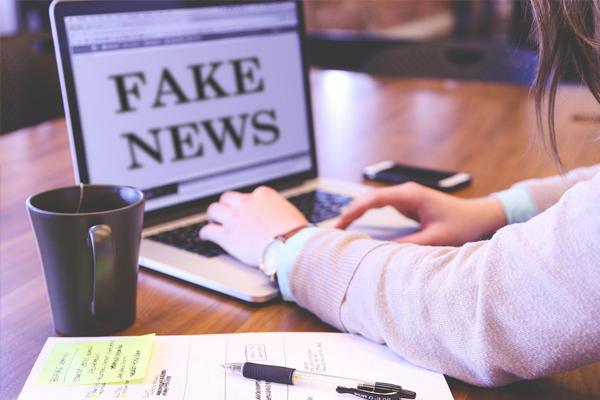South Korea’s ruling Democratic Party (DP) announced that it will push ahead with a plan to criminalize “fake news” in the name of “media reform,” which is causing strong backlash from the public and media outlets.
On Tuesday, a subcommittee meeting of the National Assembly’s Culture, Sports and Tourism Committee passed a revision to the Act on Press Arbitration. Members of the main opposition People Power Party (PPP) did not participate in the vote – as a sign of protest. “This means that media reform finally made its first step,” said Yoon Ho-jung, floor leader of the DP. “It is to protect people from fake news and establish a fair press environment.” He suggested that his party will expedite the process to finalize it by the end of next month.
The bill will allow the imposition of punitive damage on media outlets for reporting disinformation or misinformation, which is often dubbed as “fake news.” According to the bill, those damaged by fake news resulting from the intent of reporters or media outlets, or simple negligence, can claim punitive damages of five times the damage they suffered. Critics say that “intent” is not something objective and can be misused by those in power.
One of the other controversial changes to the law is to set the damages based on the amount of each media outlet’s revenue over the previous year. The lower ceiling of the damage will be 1 over 10,000 percent of each media outlet’s revenues and the upper ceiling will be 1 over 1,000 percent of revenue. In cases where it is difficult to calculate the damage, the upper ceiling will be 100 million won ($86,450). In South Korea, the top three biggest newspapers are considered more conservative than others and are strong critics of the current Moon Jae-in administration and other leftists. Roh Dong-il, professor at Kyunghee University, told the JoongAng Ilbo newspaper that it does not make sense that the companies with more money pay more than smaller companies when they cause the same damage. “It is illogical, since it is not the case that bigger companies always cause bigger damage when compared to smaller companies.”
Lawmakers from the PPP argued that the bill is unconstitutional and an attempt to quiet the media ahead of the next presidential election. “President Roh Mu-hyun tried to diversify the media and lots of new media outlets were created at that time,” said Lee Jun-seok, head of the PPP. “People who called themselves the successors of Roh are trying to limit freedom in media reporting and make the media environment very passive.”
Experts have argued that the revision could be used to block criticism of political and economic power, which is one of the main roles of the media. They said media outlets may feel hesitant to cover thorny issues, such as corruption allegations against influential or powerful figures, over concerns that they could face a punitive lawsuit.
Five media-related groups, including the Journalists Association of Korea and the Korea News Editors’ Association, issued a joint statement on Wednesday condemning the revised bill. They said that any attempt to control the media will seriously harm democracy.
“We strongly oppose the DP’s push to pass the revision, and urge it to stop such an anti-democratic revision process,” the statement said. The groups defined the revision as a bad law that attempts to prevent reports critical of the government and ruling party contenders ahead of the presidential election.
“Looking at our history, we are well aware that control of the press causes major damage and pain to the people and to democracy. While past military dictatorial regimes controlled freedom of speech through force, now the ruling party is trying to control it through its supermajority position in the Assembly.” They added that they will take every measure to prevent the bill’s passage, including filing a petition with the Constitutional Court.
Most of the major newspapers in South Korea ran editorials about the bill in their Thursday edition. The Chosun Ilbo newspaper said it is globally unprecedented for damage to be determined based on a media outlet’s sales. “If this media quarantine bill is passed, South Korea will no longer be a country with freedom of the press,” the editorial read. “Those who say they were members of the pro-democratic movement are now conducting an undemocratic act.”
The JoongAng Ilbo newspaper ran an editorial on Thursday titled, “The DP’s media bill is unconstitutional in both its content and procedures.”
“A controversial clause on the ‘assumption of intentional and grave mistakes’ is dumbfounding due to its arbitrariness and ambiguity,” it said. “The revision forces media outlets — not the victims — to disprove the allegations of making intentional and erroneous reports. That clashes with our civil law. In the United States, victims must prove maliciousness even if the news media makes an error.”
The editorial added that, “The DP must stop its attempt to gag the press ahead of the March 9 presidential election next year.”
Song Young-gil, head of the DP, also announced on Wednesday that the party will also propose a bill to regulate online news portals. He said the portals have problems in their algorithms that decide how articles are displayed and ordered.
The DP is also considering adopting a so-called “media voucher” program. They will provide points to online users, and they can use their points to support certain media outlets and articles. The government will decide on the amount of government advertisements per media outlet based on the ratings. Experts showed concerns that certain factions of people can manipulate the ratings by voting heavily for or against certain media outlets, and the media would only generate articles that would accord with public sentiment.


